Related Research Articles
The Book of Numbers is the fourth book of the Hebrew Bible and the fourth of five books of the Jewish Torah. The book has a long and complex history; its final form is possibly due to a Priestly redaction of a Yahwistic source made sometime in the early Persian period. The name of the book comes from the two censuses taken of the Israelites.

Isaiah was the 8th-century BC Israelite prophet after whom the Book of Isaiah is named.

Jacob, later given the name Israel, is regarded as a patriarch of the Israelites and is an important figure in Abrahamic religions, such as Judaism, Christianity, and Islam. Jacob first appears in the Book of Genesis, where he is described as the son of Isaac and Rebecca, and the grandson of Abraham, Sarah, and Bethuel. According to the biblical account, he was the second-born of Isaac's children, the elder being Jacob's fraternal twin brother, Esau. Jacob is said to have bought Esau's birthright and, with his mother's help, deceived his aging father to bless him instead of Esau. Later in the narrative, following a severe drought in his homeland of Canaan, Jacob and his descendants, with the help of his son Joseph, moved to Egypt where Jacob died at the age of 147. He is supposed to have been buried in the Cave of Machpelah.
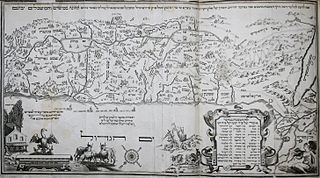
The Israelites were a group of Semitic-speaking tribes in the ancient Near East who, during the Iron Age, inhabited a part of Canaan.
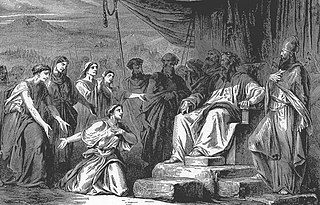
The Daughters of Zelophehad were five sisters – Mahlah, Noa, Hoglah, Milcah, and Tirzah – mentioned in the biblical Book of Numbers. They lived during the Israelites' Exodus from Egypt as they prepared to enter the Promised Land and who raised before the Israelite community the legal case of a woman's right and obligation to inherit property in the absence of a male heir in the family. Zelophehad, a man of the Tribe of Manasseh, had five daughters but no sons, and therefore no male heirs.

According to the Hebrew Bible, the Tribe of Manasseh was one of the Tribes of Israel. It is one of the ten lost tribes. Together with the Tribe of Ephraim, Manasseh also formed the House of Joseph.
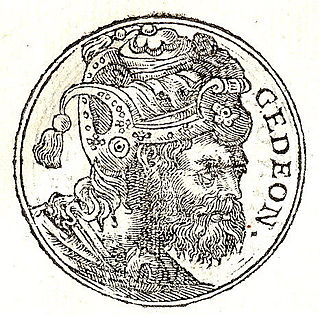
Gideon also named Jerubbaal and Jerubbesheth, was a military leader, judge and prophet whose calling and victory over the Midianites are recounted in Judges 6–8 of the Book of Judges in the Hebrew Bible.
According to the Bible, Gershom was the firstborn son of Moses and Zipporah. The name means "a stranger there" in Hebrew,, which the text argues was a reference to Moses' flight from Egypt. Biblical scholars regard the name as being essentially the same as Gershon and in the Book of Chronicles the progenitor of one of the principal Levite clans is sometimes identified as Gershom, sometimes as Gershon.

Ephraim was, according to the Book of Genesis, the second son of Joseph ben Jacob and Asenath. Asenath was an Ancient Egyptian woman whom Pharaoh gave to Joseph as wife, and the daughter of Potipherah, a priest of ʾĀwen. Ephraim was born in Egypt before the arrival of the Israelites from Canaan.

An ephod was a type of apron, which according to the Hebrew Bible, was worn by the Jewish high priest the kohen gadol, an artifact and an object to be revered in ancient Israelite culture, and was closely connected with oracular practices and priestly ritual.
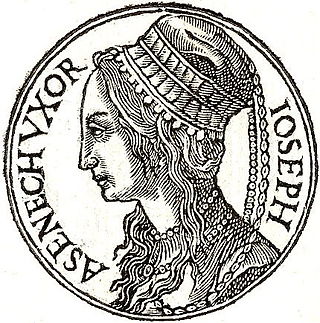
Asenath is a minor figure in the Book of Genesis. Asenath was a high-born, aristocratic Egyptian woman. She was the wife of Joseph and the mother of his sons, Manasseh and Ephraim.

Amon of Judah was the fifteenth King of Judah who, according to the biblical account, succeeded his father Manasseh of Judah. Amon is most remembered for his idolatrous practices during his short two-year reign, which led to a revolt against him and eventually to his assassination in c. 641 BC.

The Twelve Tribes of Israel are, according to Hebrew scriptures, the descendants of the biblical patriarch Jacob, who collectively form the Israelite nation. The tribes were through his twelve sons through his wives, Leah and Rachel, and his concubines, Bilhah and Zilpah. In modern scholarship, there is skepticism as to whether there ever were twelve Israelite tribes, with the use of the number 12 thought more likely to signify a symbolic tradition as part of a national founding myth, although some scholars disagree with this view.
Richard Elliott Friedman is an American biblical scholar, theologian, and translator who currently serves as the Ann and Jay Davis Professor of Jewish Studies at the University of Georgia.

Manasseh or Menashe was, according to the Book of Genesis, the first son of Joseph and Asenath. Asenath was an Egyptian woman whom the Pharaoh gave to Joseph as wife, and the daughter of Potipherah, a priest of On. Manasseh was born in Egypt before the arrival of the children of Israel from Canaan.
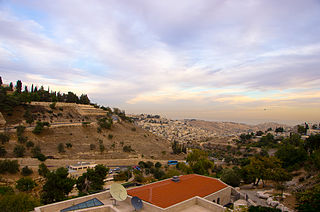
The Valley of Hinnom, Gehinnom or Gehenna is a historic valley surrounding Ancient Jerusalem from the west and southwest that has acquired various theological connotations, including as a place of divine punishment in Jewish eschatology.
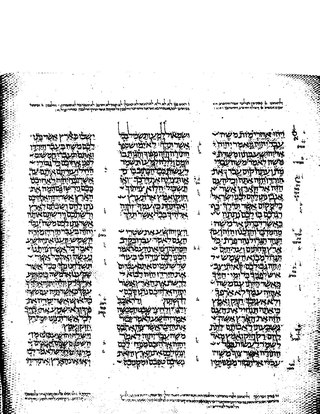
Joshua 17 is the seventeenth chapter of the Book of Joshua in the Hebrew Bible or in the Old Testament of the Christian Bible. According to Jewish tradition the book was attributed to the Joshua, with additions by the high priests Eleazar and Phinehas, but modern scholars view it as part of the Deuteronomistic History, which spans the books of Deuteronomy to 2 Kings, attributed to nationalistic and devotedly Yahwistic writers during the time of the reformer Judean king Josiah in 7th century BCE. This chapter records the allotment of land for the tribe of Joseph, especially the tribe of Manasseh, a part of a section comprising Joshua 13:1–21:45 about the Israelites allotting the land of Canaan.

According to the Hebrew Bible, the Tribe of Reuben was one of the twelve tribes of Israel. Unlike the majority of the tribes, the land of Reuben, along with that of Gad and half of Manasseh, was on the eastern side of the Jordan and shared a border with Moab. According to the biblical narrative, the Tribe of Reuben descended from Reuben, the eldest son of the patriarch Jacob. Reuben, along with nine other tribes, is reckoned by the Bible as part of the northern kingdom of Israel, and disappears from history with the demise of that kingdom in c. 723 BC.
References
- ↑ "Asriel". Jewish Encyclopedia. 1906.
- ↑ David Mandel Who's Who in the Jewish Bible 2010 - Page 46 0827610297 ...Asriel. (Hebrew origin: Helped by God) (Numbers 26:31) 17th century b.c.e. Asriel and Machir were the two sons of Manasseh and his Aramean concubine.[ citation needed ] Asriel was the ancestor of the clan of the Asrielites.